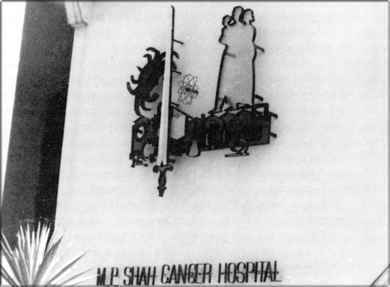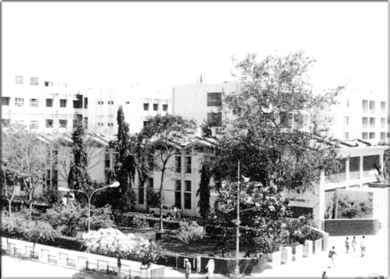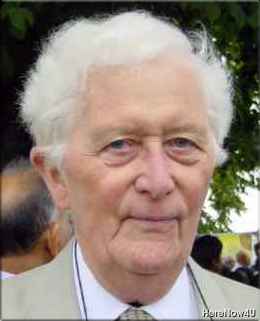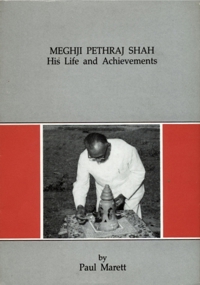
It was Meghjibhai's policy when making large donations for charitable purposes that, where possible, the money should provide the seed, or perhaps the impetus, from which the project in question could grow. The M.P. Shah Cancer Hospital in Ahmedabad is a good example of this approach. The hospital was planned in a modest way. In seeking funds, the initial contact with Meghjibhai seems to have been established through Shri Dhebarbhai, the Chief Minister of Saurashtra before the new state of Gujarat was created in 1960. Meghjibhai paid a visit to Surendranagar in October 1962. One day after lunch the Governor of Gujarat telephoned Meghjibhai from Ahmedabad and expressed a wish to see him. Meghjibhai had no idea why the meeting had been arranged but he and Maniben went by car to Ahmedabad, perhaps eighty miles away by road, at once. This was the first time he had met the Governor.
When they met the Governor explained that there was a proposal to set up a special hospital in Gujarat for the prevention and treatment of cancer. Needless to say, the project would cost a lot of money. Meghjibhai listened to the whole scheme with considerable interest. He was impressed by the plans and, as he was accustomed, made his decision quickly. Within half an hour he expressed his desire to donate three quarters of a million rupees towards the foundation of the cancer hospital. The plans for the hospital went ahead during 1963. Originally it was intended that the donation should be paid in rupees.
With the name of Meghjibhai associated with the project, and with a firm promise of such a large donation, other donors were encouraged to come forward. Meanwhile it became apparent that, owing to India's foreign exchange situation at that time, the donation would have greater value if it were paid in sterling enabling the hospital to buy the expensive modern equipment needed in the diagnosis and treatment of cancer, which was not then available in India. (Curing cancer involves 60% diagnosis and 40% treatment). Other generous help meant that all transport and insurance costs were provided free of charge. Sadly, Meghjibhai himself did not live to see his generosity come to fruition. In fact, the funds were transferred to the hospital only in December 1964, nearly five months after Meghjibhai had passed away. The M.P. Shah Cancer Hospital is a fine memorial to him.

Today the Hospital, together with the attached Gujarat Cancer Research Institute, occupies two large modern blocks. The initial impetus provided by Meghjibhai has meant that donors have come forward and contributed generously. For example, twelve patients a year have their complete treatment provided free by the generosity of one donor whose wife suffered from breast cancer. The United Kingdom government selected this hospital as a recipient of aid under the Colombo Plan and still contributes. The hospital has 400 beds and caters also for a large number of out-patients. Vans fitted with diagnostic equipment visit twenty-nine satellite centres in Gujarat. The equipment in the hospital is comprehensive and up-to-date. A particular specialism is concerned with cancer of the head and neck, which accounts for a high proportion of male cases in Gujarat, attributed to the smoking of the local 'bidis' (country cigarettes) and (though more commonly in areas outside the state) to the habit of chewing pan with tobacco rather than betel nut. Treatment is free for patients in the lower income groups, others pay in proportion to their income, but patients' fees account for only about ten per cent of the running costs of the Hospital. Something, which is often forgotten, is that cancer patients are likely to be elderly and may well have a heart condition as well. Hence the Hospital has a four-bed fully equipped intensive care unit. This was provided, together with certain advanced diagnostic equipment, by a second donation in January 1970, following a visit by Maniben and her son Vipin. Altogether the seed initially planted by Meghjibhai, 750,000 rupees, has blossomed into gifts by many later donors, encouraged by Meghjibhai' s name and generosity, of between thirty and forty million rupees.

The total donations from the Meghji Pethraj Shah Charitable Trust to education and social service in Gujarat and Saurashtra came to more than ten million rupees during Meghjibhai's life-time alone. This was matched by the government to the tune of thirty million rupees to start with and another thirty million rupees in further development. Annual running costs, some five million rupees, of the various institutions are met by the government. Thus Meghjibhai has provided facilities for study for 4,000 college students at any given time, as well as 34,000 pupils in schools of all levels, from infant schools to high schools. Hostels were erected for 1,200 children and 1,200 additional beds were provided in various hospitals.
The trusts, which Meghjibhai set up, are still functioning today. In addition to the money expended in India, his donations in East Africa amounted to some five million rupees. Meghjibhai continued, to the end of his life, to take a keen interest in the institutions, which he had founded. It was never his practice to get a project going, hand over the money and then wash his hands of it. He would follow its progress carefully and make sure that every single rupee was put to good use.
 Dr. Paul Marett
Dr. Paul Marett

